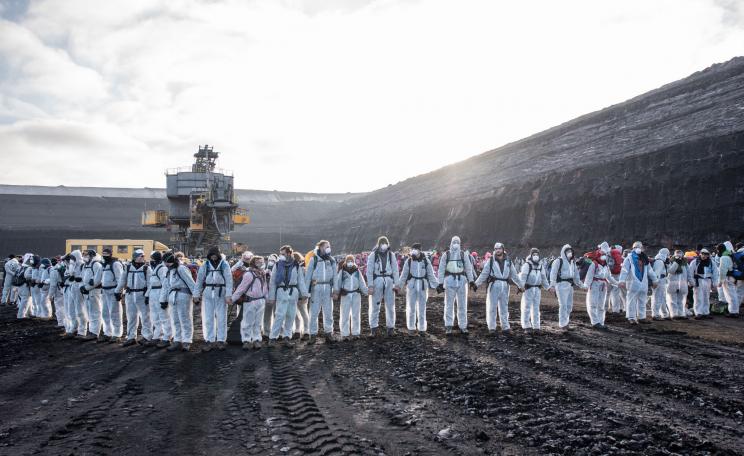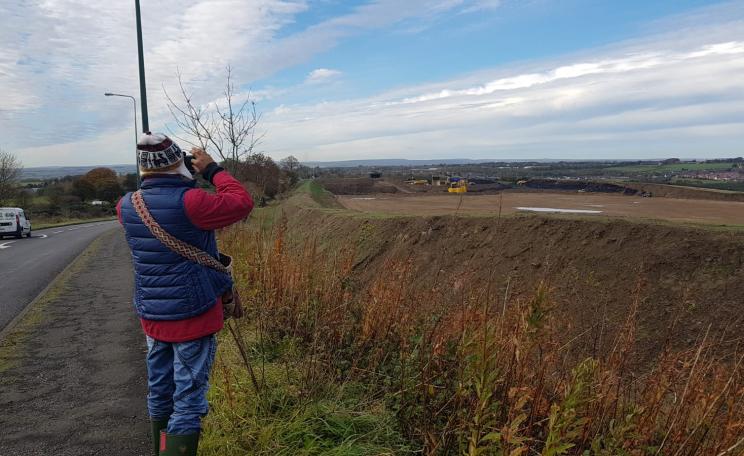We could be looking very shortly at a scenario where in the UK there is no commercial coal mining happening in 2024 for the first time in over 400 years.
Climate campaigners Coal Action Network (CAN) are this week appealing a judge’s ruling that effectively gives the green light to the extension of a coal mine at Aberpergwm in south Wales.
Last year, the campaigners took the Welsh Government and mining regulator the Coal Authority to court over the way they handled an application by the mine operator Energybuild to extend its extraction area by 1,460 hectares, and digging up as much as 42 million extra tonnes of coal.
The Coal Authority approved the extension of the licence in January 2022. It claimed it had no power to refuse the licence as long as applicants met the criteria set by the 1994 Coal Industry Act.
Exceptional
Solicitors for CAN argued that the Welsh Government could refuse to approve the licence under the Wales Act 2017, a position the Coal Authority supports.
But the Welsh Government claimed that it could not intervene because the colliery was granted its coal mining license before powers were devolved.
Mrs Justice Steyn decided in favour of the Welsh Government. However, she granted CAN permission to appeal the decision, the hearing for which is today, Tuesday 6 February 2024 at Cardiff Crown Court.
Daniel Therkelsen of CAN said that if it wins its case, the Welsh Government will be tested on its commitments on coal extraction and climate change.
In 2021, it issued a new policy stating that there should be a presumption against new or extended coal mines except in “wholly exceptional circumstances”.
Extraction
But the Welsh Government has stopped short of an outright ban. In October 2023, over 30 Wales-based campaign and community groups and businesses signed an open letter to Wales’ climate change minister, Julie James, calling for the government to ban coal mining once and for all, arguing that caveats in the current policy were confusing for local authorities.
This was demonstrated when planners at Carmarthenshire County Council considered an application to extend Glan Lash opencast coal mine, it pointed out. The planning officer wrote in a report outlining recommendations to the planning committee that the application did “largely” meet the Welsh Government’s criteria that allow for extensions to go ahead since much of the coal would be for non-energy uses, but admitted that it was “difficult to know for certain how to interpret the coal policy.”
We could be looking very shortly at a scenario where in the UK there is no commercial coal mining happening in 2024 for the first time in over 400 years.
In her response, James said that the Welsh Government did not want a total ban, since it had a duty to manage “the safe closure and restoration of existing and historic mining infrastructure”, and since the incidental extraction of small amounts of coal might also be required during construction of infrastructure projects.
An outright ban would also have prevented the situation at Ffos-y-Fran where operator Merthyr South Ltd continued to extract coal for several months despite having been refused planning permission by Merthyr Tydfil Borough Council, CAN said.
Mining was scheduled to finally cease at Ffos-y-Fran on 30 November 2023, following enforcement action by Merthyr Tydfil Borough Council. A spokesperson for the council confirmed that the council had visited the site in person to check that coal extraction was no longer taking place.
Permit
This is support by quarterly statistics from the Coal Authority, which revealed that 69,489 tonnes of coal was extracted at the site between October to December last year, compared with an average of 111,366 tonnes for each of the preceding three quarters.
The data indicated that coaling had ended during the final quarter, according to Therkelson. The end of coaling at Ffos-y-Fran, which was the UK’s largest open cast mine, represented an “exciting prospect,” he said.
“If we win the Aberpergwm case, we could be looking very shortly at a scenario where in the UK there is no commercial coal mining happening in 2024 for the first time in over 400 years, which is amazing - there's a lot at stake here,” he added.
Even if it loses, it is unclear where Energybuild, Aberpergym’s operator, plans to sell the coal from the expanded mine. According to the company’s website, some 70 per cent of the coal currently goes to steel making and domestic heating, with the remaining to mixed industrial uses such as water filtration. It cites Tata Steel as a key buyer. It did not respond to a request for comment on where it plans to sell the coal now that the UK’s blast furnaces, including Tata’s at Port Talbot, will be closed down.
The deep coal mine site at Whitehaven in Cumbria still has permission to go ahead. Work on site has yet to begin but developer West Cumbria Mining says that this will begin in 2024. However, the final go-ahead is pending a decision by the High Court on two legal actions by Friends of the Earth and South Lakes Action on Climate Change (SLACC), who are challenging the government’s decision to permit the mine.
Void
Meanwhile, Ffos-y-Fran mine operator Merthyr South Wales is expected to submit a planning application for the restoration of the site this year, according to a spokesperson for Merthyr Tydfil Borough Council.
The company has previously admitted that it does not have sufficient funds to restore the site, either in the escrow account it set up with the council to pay for restoration in the event that it ran out of money, nor in its own funds, according to a report to the council.
Campaigners and local residents fear that the council will be left to pay the bill. However, the council admitted in January that it had a shortfall of £13 million for its total budget for 2024/25, rising to a total of £23.3 million to 2026/27. It is preparing to make redundancies.
The council has access to £15 million put aside by the operator in the escrow account. But the cost of restoration has been estimated by the council to be as much as £150 million. The most likely scenario under these circumstances is that the company does not fill in the void left by the mining, instead leaving it to fill with water, according to Therkelson.
Restoration
There is precedent for this at other former coal mines in Wales, such as at Margam, near Bridgend, where after years of legal cases, the Neath Port Talbot was forced by Celtic Energy Ltd to accept a restoration plan for £5.7 million instead of the £58 million restoration it had originally promised.
This raises concerns over safety and water pollution for local communities, he said. The water at Margam is fenced off, with danger signs to deter entry.
Therkelson said: “What the council doesn't want to be doing it trying to find £120 million to restore a coal mine, so there'll be a lot of pressure on the counsellors to just okay anything that's put in front of them, even though it represents a budget cut for the restoration of around 90 per cent.”
CAN is pushing for full restoration of the mine site via a petition to the Welsh Government and Merthyr Tydfil County Borough Council.
This Author
Catherine Early is a freelance environmental journalist and chief reporter for The Ecologist. She tweets at @Cat_Early76.







